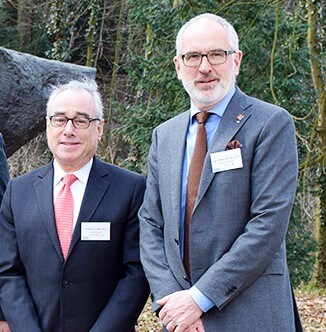The Open Medical Institute continued its 2021 course series with an OMInar in Neurology from March 23-25, 2021. The course, under the academic leadership of Weill Cornell Medicine, took place for the 25th time in 2021. This year, the course was held as an interactive multi-day webinar for the first time.

Course director Dr. Matthew E. Fink (Weill Cornell Medicine) is well acquainted with the program, as he led the course for the tenth time since 2007. The same is true for Austrian co-course director Dr. Eugen Trinka (Christian Doppler University Hospital), who has co-directed the course for 11 years in a row now. As Dr. Fink could not be present during the OMInar, Dr. Trinka stepped in and led us through this year’s compelling schedule.
The OMI faculty was completed by the following speakers from the US: Dr. Stanley Fisher, Dr. Dara G. Jamieson, Dr. Padmaja Kandula, and Dr. Alexander E. Merkler as well as Austrian faculty members Dr. Markus Leitinger, Dr. Stefan Leis, Dr. Monika Killer-Oberpfalzer, and Dr. Nele E. Bubel. All speakers participated in OMI Seminars in previous years and we were delighted to welcome them again!
These leading experts in Neurology shared their up-to-date knowledge on the following topics:
Talks & Speakers on Tuesday, March 23
- Drug Resistant Epilepsy: A Practical Approach (Eugen Trinka, MD, MSc, FRCP)
- Migraine: Clinical Pearls and Treatment Updates (Stefan Leis, MD, MME)
- Diagnosis of Parkinson’s Disease (Stanley Fisher, MD, FANA, FAAN)
- Movement Disorders (Stanley Fisher, MD, FANA, FAAN)
Talks & Speakers on Wednesday, March 24
- Headache and Stroke (Dara G. Jamieson, MD)
- Use and Abuse of EEG: A Critical Approach (Markus Leitinger, MD)
- Seizure Semiology (Padmaja Kandula, MD)
Talks & Speakers on Thursday, March 25
- Update Neurointervention (Monika Killer-Oberpfalzer, MD)
- Training and Organisation of a Stroke Team (Nele E. Bubel, MD)
- Hemorrhagic Stroke: Causes, Complications and “Cures” (Dara G. Jamieson, MD)
The schedule was completed by Neuro COVID-19 Updates from the USA (Dr. Alexander E. Merkler, Weill Cornell Medicine) and from Europe (Dr. Eugen Trinka, Christian Doppler University Hospital).
36 fellows from 22 different countries around the world were invited to participate in the OMInar. The group was very engaged, which resulted in lively discussions due to many questions being addressed to the lecturers.
During the Grand Rounds with Fellows’ Case Discussions on the second and third day of the OMInar, 11 nominated fellows from Albania, Bulgaria, Ethiopia, Hungary, Mexico, Moldova, Russia, and Serbia had the chance to present their clinical cases. These cases were screened and chosen by the course directors prior to the event and can be accessed via the OMI Case Library, which also contains all excellent cases from previous OMI Seminars and OMInars.
I would like to use this moment to thank you and all the people behind the curtains for the management of this OMInar. It was among the best, if not the best, online experiences out of a solid number of virtual educational events I e-attended during the pandemic. Tech support onboard throughout the event, ongoing moderation, excellent lecturers, interactivity, enough time for discussion – these are just a few things that made these three days outstanding. The only thing that was severely lacking is networking and interaction with fellows and faculty outside the formal program.But, of course, I hope that next year we will be able to come to the live event and enjoy face-to-face sessions.Once more, thank you for all your time and patience – it was a great learning opportunity!